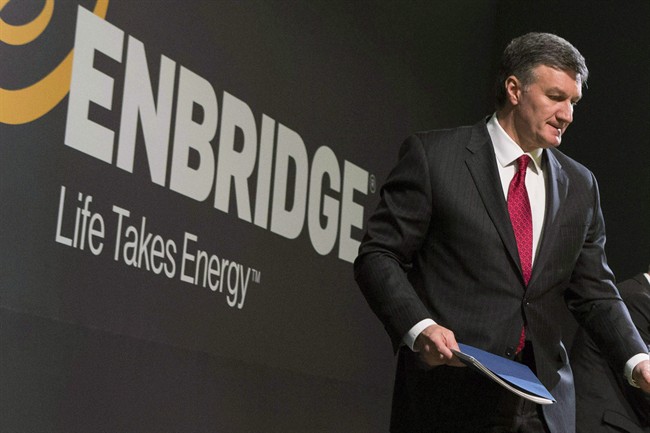The head of Canada’s largest pipeline company is touting the increased safety of the industry as he awaits word on the fate of two major expansion projects from the Trudeau government.

Enbridge (TSX:ENB) chief executive Al Monaco said on an investor call Friday that the heightened critical focus on the industry has led to significant improvements.
“The fact of the matter is that the additional scrutiny, and the tension — although perhaps uncomfortable — is leading the entire industry, I think, to get better,” said Monaco.
Pipeline safety has once again come to the forefront after a Husky Energy pipeline leaked more than 200,000 litres of oil into the North Saskatchewan River last week.
READ MORE: Prince Albert, Sask. to get new water supply after Husky oil spill
Watch below: Coverage of the Husky Energy oil spill near Maidstone into the North Saskatchewan River.
Enbridge’s own problems with pipeline safety were also highlighted recently when on July 20 the company reached a US$177-million settlement with the U.S. government for a 2010 spill that released some 3.2-million litres of oil into Michigan’s Kalamazoo River.
Monaco said perceptions around what’s acceptable have also shifted recently.
READ MORE: Calgary-based Enbridge to spend more on equipment that could be used in oil spills
“Years ago in our industry we would have said, ‘You know, things happen.’ And of course they do when you run industrial assets, but we’re very focused today in making sure that we’re striving for zero, zero incidents,” he said.
Monaco’s comments come as the company waits to hear the fate of its two major pipeline projects in Canada: the $7.5-billion replacement of its Line 3 pipeline from Alberta to the Great Lakes region and its proposed $7.9-billion Northern Gateway project that would take oilsands crude to the west coast.
In April, the National Energy Board recommended approval of the Line 3 project, which would roughly double capacity on the line to 760,000 barrels a day.
READ MORE: National Energy Board looking to bolster response to pipeline spills
Final approval of the project now rests with federal cabinet, which is taking into consideration greenhouse gas impacts before deciding by Nov. 25 if the project is in the national interest.
The fate of the Calgary-based pipeline company’s Northern Gateway project also sits with federal cabinet, after a Federal Court of Appeal quashed approval of the project in a June 23 ruling.
The court found the Canadian government had failed in its duty to consult with aboriginal people before giving the green light to the project.
Federal cabinet is now in a 90-day window to decide whether to restart consultations, something Monaco said it ought to do.
“We don’t hold the federal government responsible, but we do believe that the federal government now does have an obligation to complete the consultations,” he said.
Enbridge reported a $301-million net income for the second quarter on Friday, down from $577 million in the same quarter last year.
READ MORE: Enbridge profit down 47%; company cites Fort McMurray wildfires
Earnings were hit in part by the wildfires in Fort McMurray, Alta., that cut deliveries for May and June by an average of 255,000 barrels per day — 10 per cent lower than just before the fires.











Comments